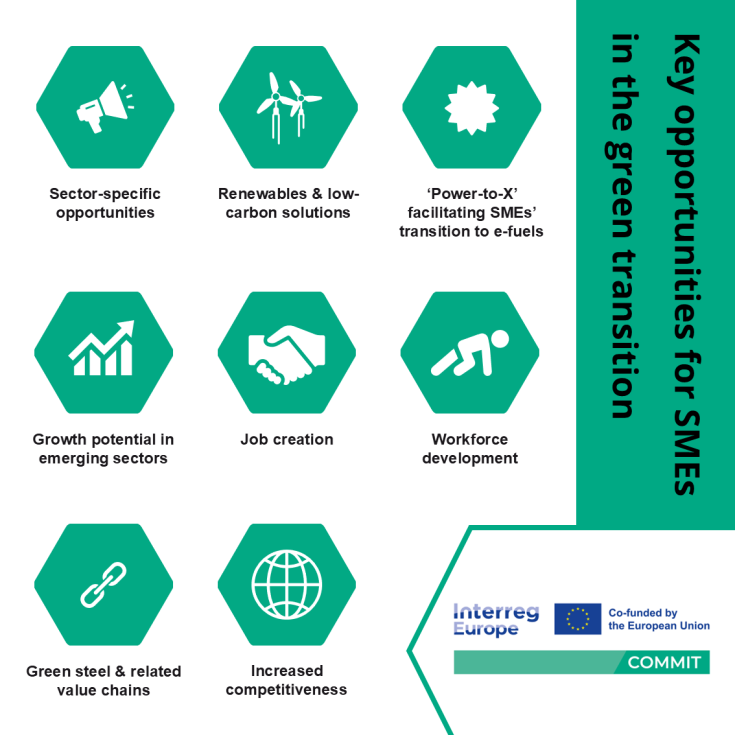Insights & Hope Ahead: Challenges & Opportunities for SMEs
As the year draws to a close, we reflect on the COMMIT project’s journey so far, revisiting the insights from our briefing paper written in Semester 1, which focused on the central theme of strategy design. In this paper, we explored strategic contexts across Europe, particularly in relation to each partner regions’ strengths, challenges and opportunities, offering a comprehensive analysis of how SMEs can be better supported in their transition towards sustainability.
At the heart of Europe’s green transformation is an ambitious framework designed to steer the continent towards a low-carbon future. The European Union's key initiatives, such as the 2050 Long-Term Climate Strategy, the European Green Deal, and the Just Transition Mechanism, serve as important guides for COMMIT regions, encouraging goals such as emission reduction, energy efficiency, and renewable energy adoption. Despite this common direction, the way SMEs are supported varies across regions, with local and regional policies playing a more prominent role in targeting SMEs directly.
The transition to a greener economy presents both challenges and opportunities for SMEs. Key obstacles identified in the COMMIT regions include economic reliance on high-emission industries, skill gaps, workforce adaptation, financial limitations, concerns about well-being, and infrastructure challenges. But amidst these hurdles, there is hope as the green transition opens exciting new prospects, particularly in emerging sectors like clean technology, energy efficiency, and the circular economy. Sectors such as manufacturing, energy, high-tech services, and even tourism are expected to benefit, with regional strategies and governance playing a principal role in determining the success of SMEs in capitalising on these opportunities.
While SMEs are actively pursuing greener practices, there is a noticeable gap in their engagement with the policymaking process. Research from COMMIT indicates that while SMEs are highly engaged in networks, their involvement in shaping policy is much lower, signalling a missed opportunity for greater influence in the green transition. Regional strategies are increasingly focused on improving SME access to finance, emphasising the importance of strong administrative capacity and effective stakeholder engagement for successful strategy implementation.
The paper also highlights best practices from the COMMIT partner regions in areas such as strategy design, stakeholder mobilisation, and support mechanisms for SME transition. These insights offer valuable lessons for policymakers and stakeholders working to move the green transition forward. Looking ahead, accelerating the low-carbon transition among SMEs will require ongoing innovation in policy, funding, capacity-building, and cross-sector collaboration.
Insights from this paper, among others gathered during COMMIT’s first few months, provide a strong foundation for fostering innovation, increasing collaboration, and empowering SMEs to flourish in a low-carbon economy. Continued efforts to refine policy, expand funding opportunities, improve access to skills and innovation, and strengthen partnerships will ensure that SMEs have the tools to co-create and co-produce a sustainable and equitable future. Stay tuned for the latest COMMIT updates coming your way in 2025!

